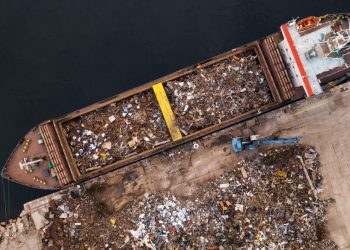A new report by OECD, ILO, IOM and UNICEF provides first ever estimates by international organizations of child labour and trafficking for forced labour in global supply chains. The report finds the estimated share of total child labour in global supply chains ranges from 9% in Northern Africa and Western Asia to 26% in Eastern and South-eastern Asia.
The results show that, while child labour is considerably more common in production for the domestic economy, there is also a non-negligible risk of child labour in production linked to supply chains that serve the global economy.
An experimental effort to extend the estimates to include human trafficking for forced labour, based on much more limited data, suggests that human trafficking is also present in global supply chains.
These results make clear that addressing child labour, forced labour and human trafficking in production for both domestic consumption and global supply chains will be critical for achieving the UN Sustainable Development Goal 8.7 “Take immediate and effective measures to eradicate forced labour, end modern slavery and human trafficking and secure the prohibition and elimination of the worst forms of child labour, including recruitment and use of child soldiers, and by 2025 end child labour in all its forms”.
Comprehensive approaches, based on authoritative international standards and informed by workers’ grievances, bottom-up interventions, and community engagement, are required for the elimination of these labour and human rights violations at scale. It is also crucial to address the public governance gaps and economic pressures that create space for non-compliance with international standards and domestic legislation and that render people vulnerable to child labour, forced labour and human trafficking, and to increase access to remedy in instances in which violations have been identified,
…the report reads.
The report’s conclusions and recommendations are structured around five key priority areas:
(a) addressing child labour, forced labour and human trafficking through a whole-of-supply-chain approach;
Across regions, between 28 and 43 per cent of child labour in global supply chains occurs in the upstream segments. These results underscore that a response that focuses only on downstream suppliers will not be enough.
Rather, a whole-of-supply-chain approach is needed, which extends in scope beyond immediate suppliers to comprise actors in the upstream segments of supply chains, in production activities such as raw material extraction and agriculture.
From a company due diligence perspective, this will entail expanding the focus from where companies may have greater leverage, particularly their immediate suppliers, to where there is greater risk, namely in the deeper supply chain and informal work environments.
Companies may have less visibility and more limited leverage over suppliers operating in the upstream segments of supply chains, but these challenges should not be used as a reason not to undertake due diligence beyond immediate suppliers.
(b) public measures to protect workers and mitigate vulnerability to child labour, forced labour and human trafficking;
Ratification by States of relevant international Conventions needs to be followed by swift action to implement them. But governments also need to go further and explore how to extend labour rights protection to the informal economy, which currently falls outside the remit of labour market institutions and where the risk of labour rights violations is especially high.
In addressing vulnerability, governments should therefore also focus on addressing informality and mainstream action into broader national development efforts aimed at mitigating socio-economic vulnerability.
This includes taking effective action to ensure access to affordable and quality schooling and pre-schooling facilities and day care, and through strengthening social protection systems and measures to increase children’s health and chances of survival.
(c) public governance measures to regulate business conduct and the business environment;
Governments should take an active role in encouraging companies to act responsibility throughout their operations and to promote respect for human rights in their supply chains through due diligence. For instance, the can:
-lead by example by integrating due diligence criteria in their own activities as owners of enterprises and in public procurement.
-encourage regulations and, where appropriate, requiring companies to carry out supply chain due diligence or to disclose and report on actions they have taken to deal with adverse human rights impacts.
-leverage various economic instruments, including export credits, development finance, trade preference programmes and regional trade agreements, to encourage responsible business conduct.
(d) responsible business conduct for labour and human rights;
Companies should implement human and labour rights due diligence approaches that cover the full supply chain, including raw material extraction, and that help address risk factors and root causes.
International instruments, principally the United Nations Guiding Principles on Business and Human Rights, the ILO Tripartite Declaration of Principles concerning Multinational Enterprises and Social Policy, and the OECD Guidelines for Multinational Enterprises, provide a comprehensive framework for due diligence.
(e) advancing collaboration and inclusive business approaches to address child labour, forced labour and human trafficking.
Multi-stakeholder partnerships and inclusive business approaches can serve as platforms to enable collaboration, focus efforts, share experiences and good practices, and accelerate progress. These partnerships can be global, such as the Alliance 8.7 Action Group on Supply Chains and the OECD Business for Inclusive Growth platform; industry specific, such as CocoaAction or the Roundtable on Sustainable Palm Oil; or national and area based, such as the Malawi Tea 2020 partnership.
Explore more herebelow:

































 =
=




























